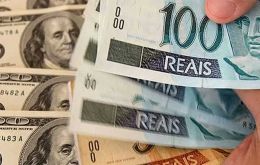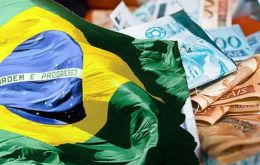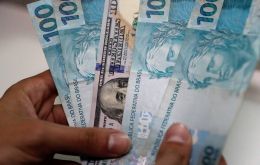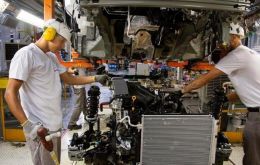MercoPress. South Atlantic News Agency
Tag: Brazil economy
-
Thursday, January 23rd 2025 - 08:59 UTC
Brazil: Dollar plunges to lowest level since November

The US dollar fell Wednesday below R$ 6 following Donald Trump's second inauguration this week in Washington DC, thus reaching its lowest level since November. Meanwhile, the stock market fell for the first time after three straight rises. The commercial dollar closed Wednesday at R$ 5.946 after hitting R$ 5.91 around 2 pm. So far this year, the US dollar went down by 3.79%.
-
Tuesday, October 25th 2022 - 18:26 UTC
Brazil's GDP forecast to grow by 2.76% in 2022

Brazilian economists have released a study whereby the country's Gross Domestic Product (GDP - the sum of all goods and services produced nationwide) is projected to grow 2.76% by the end of 2022, it was reported Monday.
-
Wednesday, October 13th 2021 - 09:05 UTC
Guedes dismisses IMF estimates for Brazil's growth this year and 2022

Brazil's orthodox Economy minister Paulo Guedes anticipated that the multilateral institutions such as the IMF, once again are going to err their forecasts on the Brazilian economy growth. The comment follows on the IMF release stating that the Brazilian economy is estimated to grow 5,2% this year and 1,5% in 2022, below the government's forecasts.
-
Saturday, July 3rd 2021 - 11:19 UTC
US Dollar climbs to R$ 5.05 in a Brazilian market hit by political turmoil

The US dollar was traded at R$ 5.05 apiece Friday amid Brazil's volatile context with President Jair Bolsonaro under investigation for alleged corruption and a mega request for his impeachment already in Congress.
-
Tuesday, February 23rd 2021 - 09:07 UTC
February a poor month for industrial confidence in Brazil

A survey from the prestigious Getulio Vargas foundation showed that Brazilian industrial confidence fell in February for a second consecutive month, further evidence that the economy is losing steam and could even contract in the first quarter.
-
Tuesday, April 28th 2020 - 06:54 UTC
Brazil industrial confidence crashed to its lowest level in April

Brazilian industrial confidence crashed to its lowest level on record in April, a survey showed as the lockdowns and sudden halt to swathes of activity lashed Latin America’s largest economy.
-
Tuesday, February 11th 2020 - 07:55 UTC
Brazilian January inflation at its lowest driven by sharp decline in meat prices

Brazilian inflation kicked off the year on a soft footing, official figures showed, as the IPCA consumer price index posted its smallest January increase since the country’s “Real Plan” was launched more than a quarter of a century ago.
-
Friday, November 29th 2019 - 09:26 UTC
Primary budget surplus during October in Brazil but nominal deficit stands at 6% of GDP

Brazil’s public finances improved in October, Treasury figures showed on Thursday, as a seasonally expected monthly surplus helped reduce the government’s overall deficit this year and keep it on track to come in below target.
-
Wednesday, October 2nd 2019 - 09:48 UTC
Brazilian industrial production rose in August at its fastest pace in over a year

Industrial production in Brazil rose in August at its fastest pace in more than a year, official figures on Tuesday showed, a sign that Latin America’s largest economy may slowly be turning a corner after flirting with recession earlier in the year.
-
Friday, August 30th 2019 - 09:43 UTC
Brazil economy rebounds in second quarter spurred by construction and industrial production

Brazil’s economy rebounded strongly in the second quarter after having shrunk in the first, official figures showed on Thursday, indicating Latin America’s largest economy comfortably avoided falling back into recession.
